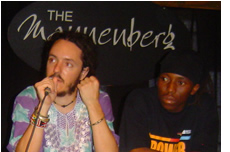Toyi-Toying while others are lax
 I was extremely disappointed to read from this week’s Zimbabwe Standard that a lot of local musicians are out of tune on censorship, their biggest threat in the music industry. The Standard said that musicians were uncertain whether they should join the rest of the world in marking Music Freedom Day on March 3 or not. After pleading last week via e-mail to artistes to suggest how to celebrate the day, Mary Jaure, spokesperson of the Zimbabwe Music Rights Association (Zimra) said she had received only one response from musician Dudu Manhenga by Thursday. She later blasted them for their laid back approach to the day. In the same story, DJ Mzee from South Africa was quoted saying: “I think it will be folly for the musicians in your country (Zimbabwe) to forget that this day is more important to them than any other. I know of the struggles people like (Thomas) Mapfumo went through.”
I was extremely disappointed to read from this week’s Zimbabwe Standard that a lot of local musicians are out of tune on censorship, their biggest threat in the music industry. The Standard said that musicians were uncertain whether they should join the rest of the world in marking Music Freedom Day on March 3 or not. After pleading last week via e-mail to artistes to suggest how to celebrate the day, Mary Jaure, spokesperson of the Zimbabwe Music Rights Association (Zimra) said she had received only one response from musician Dudu Manhenga by Thursday. She later blasted them for their laid back approach to the day. In the same story, DJ Mzee from South Africa was quoted saying: “I think it will be folly for the musicians in your country (Zimbabwe) to forget that this day is more important to them than any other. I know of the struggles people like (Thomas) Mapfumo went through.”
Last week I also challenged our readers to partake in celebrating and commemorating this day, I also hoped some musicians would give us feedback. Zilch. Well, it’s kinda sad; I think musicians should be moved to help fight their own battles. Then the rest of us can just but lend in our support. It’s more saddening considering what other serious musicians go through in order to fight for the right to freedom of expression. They risk their lives and careers through protest music and social commentary. Yet other musicians have such a nauseatingly laid back approach to it all.
But I do have the pleasure of announcing that Cde Fatso will be launching his much awaited debut album, House of Hunger that embodies the many voices of those struggling for justice in Zimbabwe. The struggles of vendors and victims of Murambatsvina, the fights of workers for a living wage, the anger of displaced, marginalized youth who walk the streets of Harare and life under Zanu PF in general. With his Toyi Toyi Poetry, Cde Fatso and his band, Chabvondoka, describe the struggle, describing Zimbabwe as a house of hunger, both literally and metaphorically.
The 28-year-old controversial artist endeavors to create what he calls a new form of urban protest music that will not just disappear after the elections, but will create a continual rebel youth culture in the struggle for liberation. His biggest target audience is the youth, although the music is expected to transcend all layers of the social fabric. The most captivating aspect of Cde Fatso’s music is that it’s a unique blend of instruments, chorus and poetry. For a sneak peep, the album consists of songs like Mastreets, which highlights the power that unemployed youth posess, though many do not realize it. City City describes the daily drudgery of ordinary citizens commuting everyday. They may encounter challenges in this failed state, but hey yo they love this place! Love You like A Riot Needs A Petrol Bomb is a song one is never sure if it is more than a love song.
If you are looking for something that will give you all the reasons why you should go and vote, this album is for you. It tells you the story of Zimbabwe, the quiet hell its citizens go through daily, and even hints on who is to blame.
The performance of Cde Fatso and band were labeled “the best of the festival†at HIFA 2007. They have also moved audiences with their rebel poetry in France, the UK and South Africa alongside artists like Mzwakhe Mbuli, Dizraeli and Chiwoniso.
Fans of protest music, freedom of expression and those who love their rights are invited to the official launch of House of Hunger at the Mannenberg Jazz Club, Fife Ave Shopping Centre, Harare, March 13, 2008 from 7:30pm till late.

